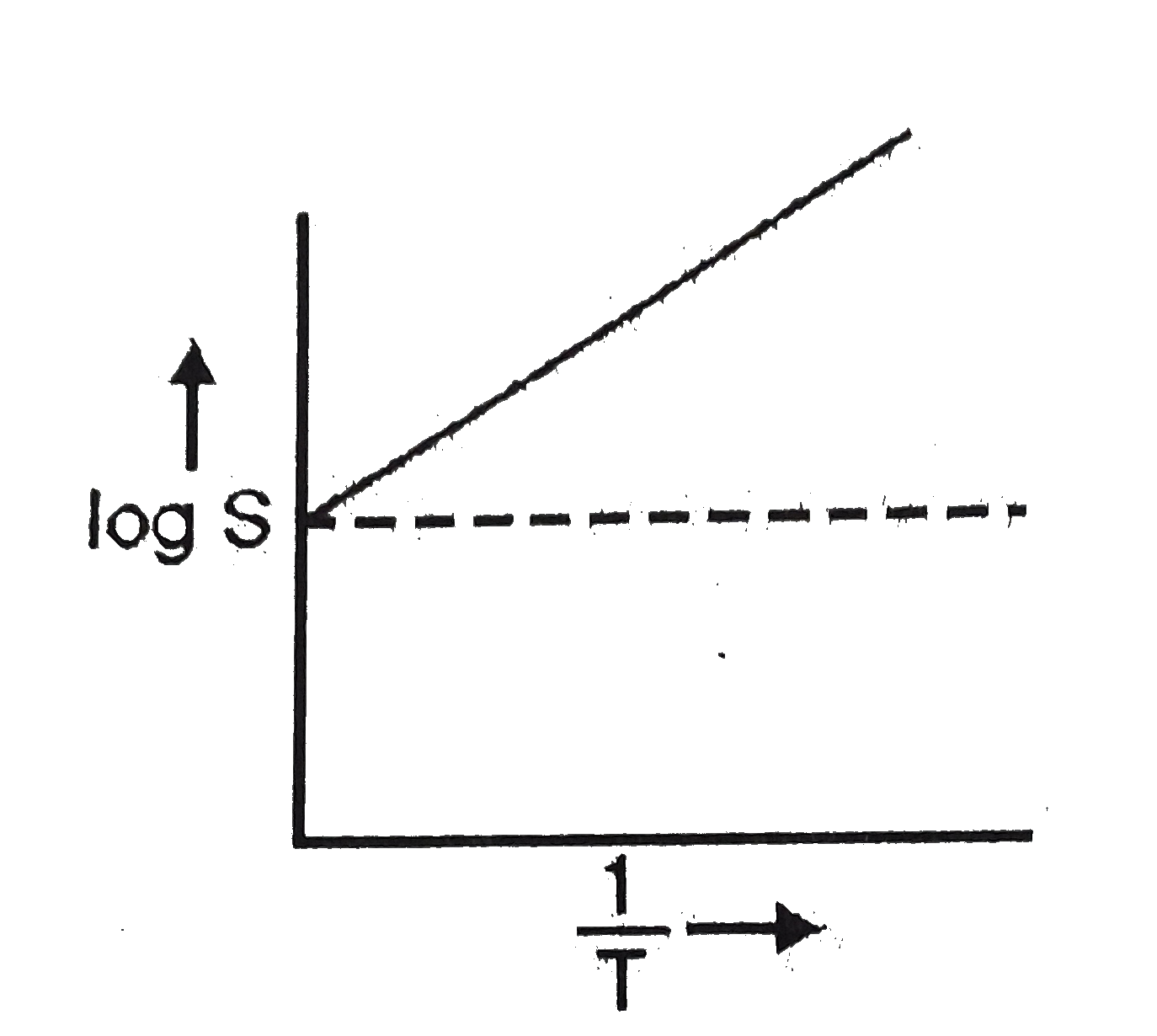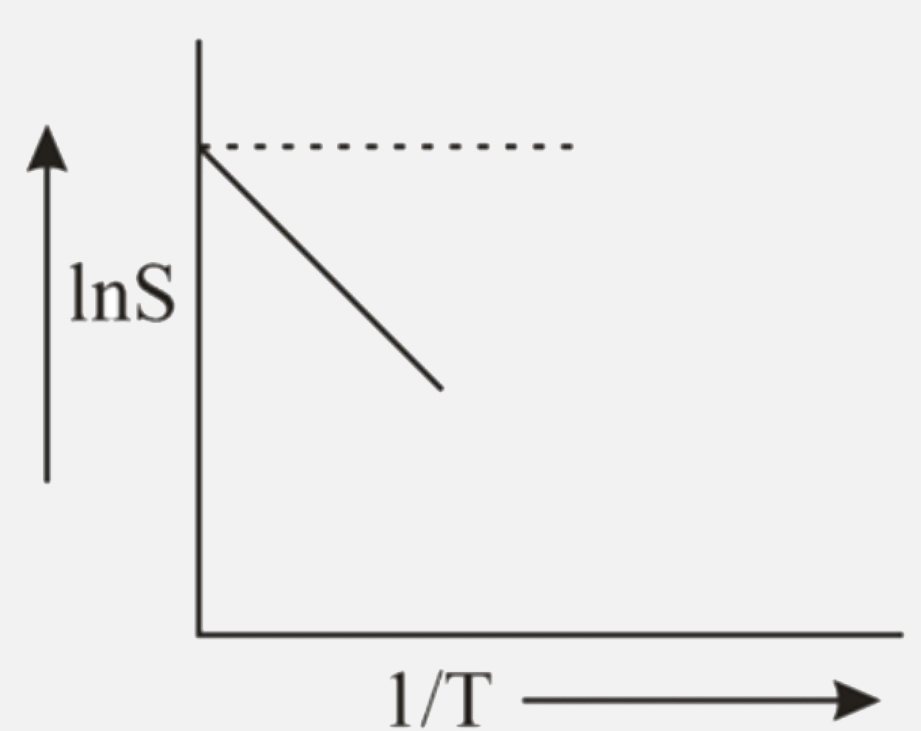Solubility (S) of a solution in a solvent (say H2) is dependent on temperature as given by S=Ae−Δ/RT where ΔH is enthalpy of solution, Solute +H2O⇔ solution,ΔH=±x
For a given solution, variation of log S with temperature is shown graphically. Hence, solute is

CuSO4.5H2O
NaCl
Sucrose
CaO
The correct Answer is:D
S=Ae−ΔH/RT
logS=logA+loge−ΔH/RT
logS=logA−ΔHRT
logS=(−ΔHR)1T+logA
As slope of line is +ve
i.e., the dissolution is exothermic.
As we know CaO (lime) dissolves in water with the evolution of heat. (Dissolution of other choices are endothermic ).
Topper's Solved these Questions
- BOOK - DINESH PUBLICATIONCHAPTER - PHYSICAL AND CHEMICAL EQUILIBRIAEXERCISE - REVISION QUESTION FROM COMPETITIVE EXAMS124videos
PHYSICAL AND CHEMICAL EQUILIBRIA
- BOOK - DINESH PUBLICATIONCHAPTER - PHYSICAL AND CHEMICAL EQUILIBRIAEXERCISE - SELECTED STRAIGHT OBJECTIVE TYPE MCQs4videos
PHYSICAL AND CHEMICAL EQUILIBRIA
- BOOK - DINESH PUBLICATIONCHAPTER - PHYSICAL AND CHEMICAL EQUILIBRIAEXERCISE - ULTIMATE PREPARATORY PACKAGE13videos
PHYSICAL AND CHEMICAL EQUILIBRIA
- BOOK - DINESH PUBLICATIONCHAPTER - P BLOCK ELEMENTS (GROUP 13 AND 14 )EXERCISE - Straight obj.17videos
P BLOCK ELEMENTS (GROUP 13 AND 14 )
- BOOK - DINESH PUBLICATIONCHAPTER - RATES OF REACTIONS AND CHEMICAL KINETICSEXERCISE - Ultimate Preparatory Package29videos
RATES OF REACTIONS AND CHEMICAL KINETICS
Similar Questions
The solubility (S) of solute in water varies with temperature as given by S=Ae−ΔH/RT,ΔH being the enthalpy of solution. For a given solute, variation of lnS with temperature is as shown in figure. The solute is expected to be
 View Solution
View SolutionIf solubility of a solute is S, find its percentage by weight
View Solution
Knowledge Check
- Question 1 - Select One
Solubility of a solute in a solvent ( say H2O ) is dependent on temperature as given by S=Ae−ΔH/RT where ΔH is heat of reaction
Solute +H2O⇔Solution , ΔH=±X
For a given solution variation of logs with temperature is shown graphically. Hence solute isACuSO4.5H2OBNaClCSucroseDCaO - Question 2 - Select One
Solubility of a solute in water is dependent on temperature as given by
S=Ae−ΔH/RT, where ΔH=heat of solution
Solute+H2O(l)⇔Solution,ΔH=±x
For given solution, variation of log S with temperature is shown graphically. Hence, solution is
 ACuSO4.5H2OBNaClCSucroseDCaO
ACuSO4.5H2OBNaClCSucroseDCaO - Question 3 - Select One
Osmotic pressure of a solution at a given temperature
Aincreases with concentrationBdecreases with concentrationCremains sameDinitially increases and then decreases
A solution which cannot dissolve any more solute at a given temperature is called………. Solution
View SolutionA solution that has dissolved as much solute as it is capable of dissolving at a given temperature is
View SolutionStatement-1 : Molarity of a solution depends on temperature but molality is independent of temperature
Statement-2 : Molarity depends on volume of solution but molality depends on mass of solventView SolutionWhen SO2 is passed through acidified solution of H2S
View SolutionRead the passage below and answer the following quesitons
Solution is a homogeneous mixture of two or more-substances in same or different physical phases. The substances forming the solution are called components of the solution. On the basis of number of components a solution of two components is called binary solution. Solute and Solvent in a binary solution, solvent is the component which is present in large quantity while the other component is known as solute. [If water is used as a solvent, the solution is called aqueous solution and if not, the solution is called non-aqueous solution. Depending upon the amount of solute dissolved in a solvent we have the following types of solutions: Unsaturated solution a solution in which more solute can be dissolved without raising temperature is called an unsaturated solution Saturated solution o solution in which no solute can be dissolved further at a given temperature is called a saturated solution Supersaturated solution a solution which contains more solute than that would be necessary to saturate it at a given temperature is called a supersaturated solution.
Of the following terms used for denoting concentration of a solution, the one which does not get affected by temperature is:View Solution

